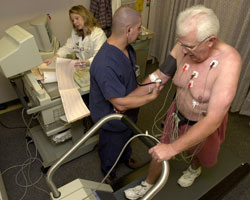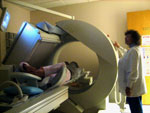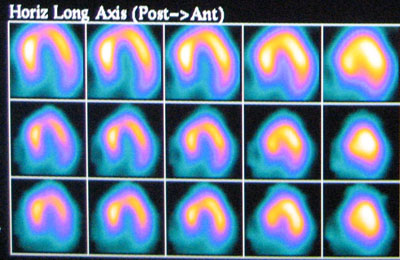In This Section
- Clinics
- Anticoagulation (Coumadin)
- Defibrillators
- Hypertension
- Pacemakers
- Tests & Treatments
- Ambulatory Rhythm Monitoring
- Angioplasty and Stents
- Ankle-Brachial Index (ABI)
- Biventricular Pacemaker
- Blood Pressure Monitoring
- Cardiac Catheterization
- Cardiac Computed Tomography
(CT) - Carotid Ultrasound
- Echocardiography
- Electrophysiology
- Exercise Stress Testing
- Pacemakers & Defibrillators
- Peripheral Vascular Disease
Exercise Stress Testing
 We have are one of the only dedicated cardiology labs in the area to be accredited by The Intersocietal Commission for the Accreditation of Nuclear Medicine Laboratories.
We have are one of the only dedicated cardiology labs in the area to be accredited by The Intersocietal Commission for the Accreditation of Nuclear Medicine Laboratories.
Exercise stress testing provides your physician a large amount of information about your cardiovascular health by evaluating the heart under an increased amount of strain. During a stress test the patient is asked to exert themselves on a treadmill thereby increasing the oxygen demand of the body and increasing the work of the heart. It is primarily used to determine if there are areas in the heart where there is a lack of blood flow which can cause symptoms such as chest pain or shortness of breath. However, it can also evaluate the prognosis of a patient after a heart attack as well as help determine an appropriate exercise regimen after such an event. In certain situations exercise testing can reveal heart arrhythmias that may be the cause of palpitations for a patient and evaluate the severity of abnormalities in the heart valves.
 A typical stress test requires the patient to be continuously hooked up to an EKG monitor as they walk on a treadmill. Men may have some chest hair shaved to insure proper electrode contact. The treadmill starts at a very slow walking pace and gradually gets faster and steeper in 3 minute increments. Blood pressures are taken with each increment. The patient is asked to exert themselves until they are no longer comfortable on the treadmill and the technician will gradually stop the treadmill. The patient can request to stop the test at any point. Typically a patient will exert themselves for 6 to 10 minutes. Depending on the patient's fitness, the patient may find themselves running on the treadmill. In order to accurately determine the presence of blockages in the arteries that feed the heart, a certain heart rate needs to be achieved. This heart rate is calculated by the patient's age and the exercise technician will try to encourage the patient on the treadmill to realize this heart rate. By studying the continuous electrocardiogram during exercise, changes can be seen which may indicate a lack of blood flow to the heart.
A typical stress test requires the patient to be continuously hooked up to an EKG monitor as they walk on a treadmill. Men may have some chest hair shaved to insure proper electrode contact. The treadmill starts at a very slow walking pace and gradually gets faster and steeper in 3 minute increments. Blood pressures are taken with each increment. The patient is asked to exert themselves until they are no longer comfortable on the treadmill and the technician will gradually stop the treadmill. The patient can request to stop the test at any point. Typically a patient will exert themselves for 6 to 10 minutes. Depending on the patient's fitness, the patient may find themselves running on the treadmill. In order to accurately determine the presence of blockages in the arteries that feed the heart, a certain heart rate needs to be achieved. This heart rate is calculated by the patient's age and the exercise technician will try to encourage the patient on the treadmill to realize this heart rate. By studying the continuous electrocardiogram during exercise, changes can be seen which may indicate a lack of blood flow to the heart.
 In certain situations an electrocardiogram alone may not be adequate, and pictures of the blood flow to the heart are needed. The latter is accomplished by placing an IV in the arm and infusing a small amount of radioactive material called MYOVIEW® (Tc99m Tetrofosmin), which "lights up" areas of the heart where there is adequate blood flow. After the initial injection the patient is asked to lie down underneath a special camera called a gamma camera which will take pictures of the blood flow in the heart at rest. This will require the patient to lie down on a table and keep both arms raised above the head for approximately 25 minutes while the camera rotates around the chest. Thirty to 60 minutes later the treadmill portion of the test is performed and a second injection of myoview is administered at peak exercise (if you weigh more than 250 pounds, you may need to perform the treadmill portion on a separate day to increase the accuracy of the exam). Afterwards the patient will be asked to leave the facility and get something to eat and drink or you can bring something with you. Again 30-60 minutes later another set of pictures will be obtained similar to the initial procedure. The pictures are then processed and later studied to evaluate the heart's function and for any areas of a lack of blood flow.
In certain situations an electrocardiogram alone may not be adequate, and pictures of the blood flow to the heart are needed. The latter is accomplished by placing an IV in the arm and infusing a small amount of radioactive material called MYOVIEW® (Tc99m Tetrofosmin), which "lights up" areas of the heart where there is adequate blood flow. After the initial injection the patient is asked to lie down underneath a special camera called a gamma camera which will take pictures of the blood flow in the heart at rest. This will require the patient to lie down on a table and keep both arms raised above the head for approximately 25 minutes while the camera rotates around the chest. Thirty to 60 minutes later the treadmill portion of the test is performed and a second injection of myoview is administered at peak exercise (if you weigh more than 250 pounds, you may need to perform the treadmill portion on a separate day to increase the accuracy of the exam). Afterwards the patient will be asked to leave the facility and get something to eat and drink or you can bring something with you. Again 30-60 minutes later another set of pictures will be obtained similar to the initial procedure. The pictures are then processed and later studied to evaluate the heart's function and for any areas of a lack of blood flow.

Pictures of blood flow to the heart
If the patient cannot exercise, another type of test can be performed which does not require any walking. This requires an IV placed in the arm and a continuous infusion of a medication Lexiscan. This substance dilates all of the blood vessels in the heart; however blood vessels with blockages are not dilated to the same degree. Pictures are obtained using Myoview® as noted above and information about blockages in the arteries that feed the heart can be obtained similar to an exercise treadmill exam. Symptoms of chest pain, shortness of breath or feeling flushed may be transiently experienced during the Lexiscan infusion, but quickly resolve after the medication is discontinued due to the short half life of Lexiscan. Patients with significant asthma should not have this exam since it can potentially cause severe breathing problems.
During any of these tests, the patient is constantly monitored by an exercise technician. A nuclear medicine technologist will handle all radioactive material and obtain the pictures of the heart with the gamma camera. If adenosine is used, a registered nurse will administer the medication. A cardiologist is always in the facility during any exam. Most patients resume usual activities immediately following ECG stress testing.
Preparation for the Exam:
- Fast for four (4) hours prior to the exam.
- Wear comfortable walking/running shoes and loose-fitting clothes.
- Do not smoke on the day of the test, as nicotine will interfere with the results of your test.
- If a nuclear (Myoview®) stress test is performed, then you should avoid drinking or eating caffeinated products (cola, Mountain Dew®, chocolate products, Excedrin®, Anacin®, diet pills, No Doz®, coffee or tea) for 24 hours before the test. Caffeine will interfere with the results of your test. Products labeled caffeine-free and decaffeinated contain trace amounts of caffeine and should also be avoided including decaffeinated coffee
- If you have asthma and an adenosine test is performed, you should avoid theophylline (Theo-dur®) for 48 hours before the test. Please plan to bring your asthma inhaler mediation to the test.
- You should hold any beta blockers, calcium channel blockers and nitroglycerin preparations on the day of the exam. This includes Atenolol (Tenormin®), Metoprolol(Lopressor®/ Toprol XL®), Nadolol (Corgard®), Pindolol (Visken®), Timolol (Blocadren®), Acebutolol (Sectral®), Propranolol (Inderal®), Sotalol (Betapace®), bisoprolol (Ziac®/ Zebeta®), Nifedipine (Procardia®/ Adalat®), Nicardipine (Cardene®), Nislodipine (Sular®), Diltiazem (Cardizem®/ Tiazac®/ Dilacor®), Verapamil (Calan®/ Isoptin®/ Covera®), Isradipine (Dynacirc®), Felodipine (Plendi®l), Amlodipine (Norvasc®), Ismo®, Isordil®, Isosorbide, Nitrobid® ,Nitro-Dur®, Nitropatch and Imdur®.
For more information about stress testing, click here.